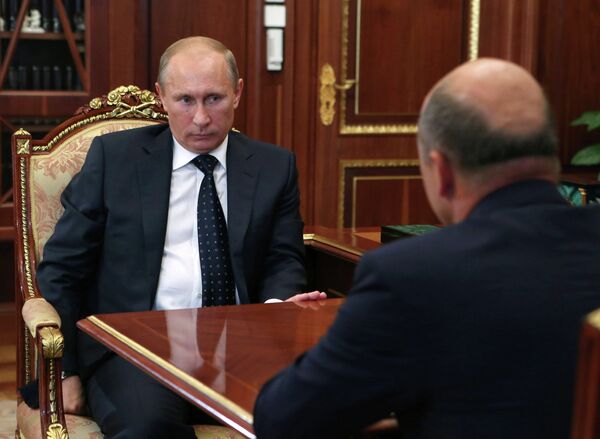Macroeconomic stability and the government’s fulfilment of all social obligations should be key in drafting the federal budget for the next three years, President Vladimir Putin said on Wednesday.
“The fulfilment of social obligations to citizens in all spheres should be an unconditional priority for us. I mean the pension system, our pension obligations, and commitments to workers of budget-financed organizations and our plans to modernize the Armed Forces,” Putin said at a meeting with Finance Minister Anton Siluanov, which discussed the government’s work on the 2013-2015 budget.
Macroeconomic stability is also crucial for Russia’s development in the next three years, Putin said.
“The basic macroeconomic indices, I mean our debt obligations, both internal and external, the budget deficit and other components must be unconditionally complied with so that we can feel confident,” Putin said.
Siluanov said the three-year budget would be drafted using new budget rules.
“The rules define the maximum spending we can afford and this is right in the conditions of unstable macroeconomic developments,” he said.
Russia’s Finance Ministry proposed introducing a budgetary rule from 2013 in which spending should be planned on the basis of the basic oil price calculated for the past five years up to 2013, the past six years to 2014 and so on, until a basic price is calculated for the past ten years.
“Our task is to create conditions allowing us to fulfil our budget obligations in full, in spite of any external economic developments or oil price movements,” he said.
The task of reducing Russia’s non-oil and gas revenue budget deficit to 6-7 percent of GDP is quite a realistic goal, Putin said.
Heavily reliant on raw material exports, primarily oil and gas, Russia's government has been pushing for economic diversification, and trying to promote higher added value production.
“This is an absolutely realistic parameter, a realistic benchmark and we undoubtedly must seek to attain and realize these plans,” Putin said.
The draft federal budget for 2013-2015 stipulates government measures to cut the budget deficit from 1.5 percent of GDP in 2013 to 0.1 percent of GDP in 2015, Siluanov said.
“Importantly, the so-called non-oil and gas revenue deficit will also be cut, which will mean cutting our dependence on oil and gas,” Siluanov said.
“The non-oil and gas revenue deficit will shrink to 8.6 percent of GDP by 2015. This is also a positive trend and we’ll continue this trend so that we can cut the non-oil and gas revenue deficit to about 6-7 percent in the coming years,” Siluanov said.
Before the 2008 crisis, Russia’s non-oil and gas revenue deficit did not exceed 2-3 percent of GDP but surged to a record 13.7 percent in 2009 before falling to 9.5 percent of GDP in 2012.



